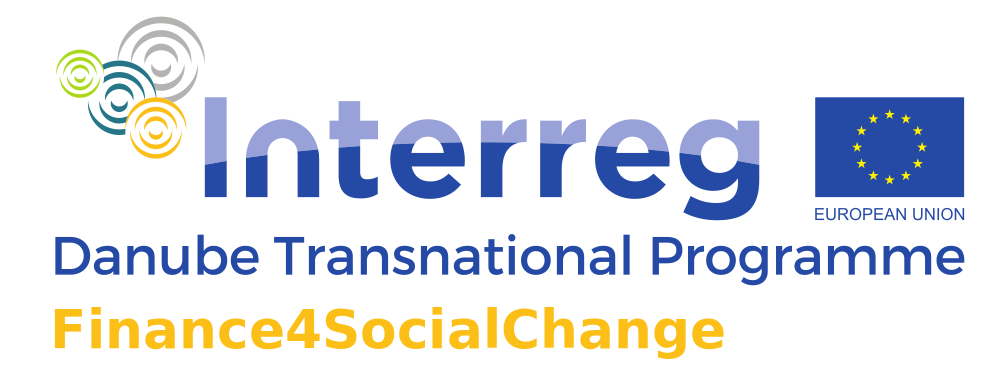Finance4SocialChange Leveraging Finance 4 positive Social Change
Press releases/ Media Articles
INNOVATIVE FINANCIAL TOOLS FOR SOCIAL ENTERPRISES

Finance for Social Change (F4SC): EU-funded INTERREG Project aims to stimulate social business across the Danube region
The aim of this article is to promote findings of research conducted within the project on existing and developing financial investment tools available for social enterprises in the Danube Region.
Nowadays, social impact investment is a relatively new financial tool that is gaining visibility and popularity among investors and entrepreneurs. The plus to the „traditional investment” lies in the aim, that social impact investment is trying to tackle social challenges besides business goals. It brings together capital and expertise from the public, private and not-for-profit sectors. However, the Danube region still lags considerably behind global trends in the field of social business and social impact investment. It is estimated that only 2% of global social impact investment (with an estimated market size of about 450 billion EUR in 2019) is targeted towards the Danube region social enterprises.
To close this gap, the project Finance for Social Change (F4SC) was launched in 2018. Supported by the INTERREG DANUBE Programme. Finance4SocialChange brings together a partnership of 14 Project Partners and 6 Associated Strategic Partners from 12 countries to deliver improved policy learning, and to develop practical solutions on impact investing. The Finance4SocialChange partnership promotes mutual learning between social enterprises, accelerators, impact investors and relevant national and regional policymakers. With a variety of different approaches and activities Finance4SocialChange aims at improving the eco-system for social investment in the Danube region.

In the first step the relevant framework conditions and policy systems of the countries of the Danube region were analyzed. The analysis reveals a great variety of financing instruments and policy measures already existing in the Danube region. These measures and instruments include:
- Self-financing: Social enterprises have some self-financing abilities. It is based on the significant contribution of volunteer work in the start-up phase of the business activities which also includes in some cases real financial support as well.
- Grants: In most of the countries there are funding mechanisms via “traditional” non-repayable instruments that are specifically targeted towards the social business sector (and social entrepreneurs). The sources of the grants are provided by the EU, by the local governments and municipalities, and a large portion arrives from private donors
- Loans: In some countries, financial intermediaries already address the credit needs of social enterprises. Existing intermediaries include traditional banks, socially-oriented banks, and dedicated financial institutions.
- Various traditional banks have created specialized institutions or particular sections (e.g. in case of the Danube region ErsteBank), which provide financial support within the framework of EU funds or address specifically the financial needs of non-profit organizations.
- Socially-oriented banks, like cooperative banks and ethical banks, are in principle particularly willing to fund locally-based initiatives, such as the ones promoted by social enterprises.

In countries where the social enterprise sector is well developed like Germany and Austria, traditional financial intermediaries are in principle able to respond to the credit needs of social enterprises. In these countries, retail banks are generally willing to provide loans to social enterprises since the sector appears to be less affected by the economic situation than traditional SMEs, and generally show a low level of risk due to the small size of social enterprises.
Innovative social finance instruments: The role of innovative financing opportunities for social enterprises is increasing generally. In the Danube region countries, the development of alternative financing schemes tailored for social enterprises are mainly supported by European funds. Such schemes and instruments are:
- Social impact investing,
- Social impact bonds,
- Social venture capital
- Other participative finance like crowdfunding
The next step of our analysis included a comprehensive overview of government political measures that target social businesses. Based on this systematic policy screening the project partners selected so-called “good practice policy measures” which may act as “role models” for policy learning and may inform and help policymakers throughout the Danube region. This so-called “Policy Learning Tool” provides information on policy measures addressing the social impact market in the countries of the Danube region. These policy measures demonstrate the wide array of approaches that are currently used to enhance the functioning of social impact investment markets in the Danube region. From the total list of policy measures considered, the 15 best were selected and analyzed by the project partners in interactive discussions based on a standardized system of 11 assessment criteria, like the value proposition to investees, the key actors needed to set it up, the possible impact for the investee, the cost structure, the key resources needed, etc. A particularly important criterion was the transferability since the tool aims at facilitating the adaptation of the best measures in other countries/circumstances.
Based on the assessment 4 case studies also were selected as state-of-the-art instruments from different sectors that support the impact of the investment. These case studies include the following programs/instruments:
- Social Impact Bonds (public-private measure), Bavaria/Germany;
- Mezzanine Capital Investment model organized by a private organization (FASE), Germany/Austria;
- FFG Impact Innovation (grant program organized by a public agency (FFG), Austria;
- Youth Bank (social enterprise) organized by an international charity fund (YouthBank International) with local partners, Bosnia-Herzegovina.

Overall, the following conclusions can be drawn from these policy analysis and assessment activities for a step-by-step approach towards stimulating and fostering social business and impact investment in the Danube region:
Stage 1: Encourage young changemakers & founders

Stage 1 starts with the encouragement of young changemakers & young founders to explore social entrepreneurship through programs such as the Youth Bank (SE driven) or – at a later stage – programs such as FFG impact innovation (public driven). These programs allow young changemakers & young founders to direct their efforts towards social impact goals, to structure their ideas, and to involve stakeholders and target groups early, in order to achieve a good solution-need (respectively product-market) fit. For this, they receive initial and (more) easily attainable funding. In our view, these programs could comprise a stronger mentoring component to deepen the learning experience of participants and to improve the outcome. For the most promising ideas coming out of such prototyping processes, follow-up funding opportunities could be offered. These follow-up opportunities could include a transition from public-only to mixed public-private funding or private funding (early-stage impact funding). A good example of Stage 1 activities is the Bildünger program, which is a cross-sector campaign with the aim to transform the Austrian educational system. It features different engagement levels, community building and seed funding for SE projects as well as projects from young founders. The advantage of the campaign is that selected SEs/founders are introduced to an already established network of actors in education which allows them to access the educational system, find partners, and apply for funding.
Stage 2: Support the development of social enterprises and their investment readiness

We understood from our mapping that more advanced social enterprises (clear impact model, clear product/service offer, proven social impact, stable team) will rely on tailor-made impact funding (not impact investment) provided by impact angels or private foundations. Impact angels can act as mentors in addition to funding the social enterprise. At this stage, an impact angel will not expect a financial return. However, impact angel and social enterprise will align on expectation regarding the further development of the impact and business model, a strategy for replication/scaling (from partnerships to social franchising) and improvement of organizational performance. As a result of this stage, we would expect to see professional social enterprises on a development path towards scalable impact and business models. An interesting strategy in stage 2 can be the financial support of SE incubators as for instance provided by the Austrian good practice AWS Jumpstart. The program funds incubators that provide support to start-ups and/or SEs to build up their capacity. A part of the funding is dedicated directly to SEs supported by the incubator.
Stage 3: Provide private investments to investment-ready SEs
At this stage, the social enterprise may be ready to ask for impact investment based on a track record of achieving social impact, a track record of good organizational performance, a clear product/service offering and proven demand, and a smart replication/scaling model that allows the social enterprises to increase revenue over time. At this stage, funding instruments such as the mezzanine capital instrument used by FASE can be applied. These models work with scenarios with low but realistic returns on investments while also emphasizing the impact goals of the social enterprise. Investment collectives are a new trend in the impact investment sector. A group of investors established a shared process and criteria to identify, assess, select and fund social enterprises. Furthermore, the collectives set up processes to generate a pipeline of new, investment-ready SEs. The investment collective may, for instance, be connected to an incubator program.
Stage 4: Provide opportunities for long-term funding for SEs

An instrument such as the social impact bond seems to be designed for providing funding to established social enterprises that show all the characteristics of stage 3 and have a strong track record of not only achieving social impact but achieving more impact than comparable public support offers. The idea of social impact bonds is to introduce new, innovative and improved approaches to respond to the needs of specific target groups who may already receive support provided by welfare state institutions. Social impact bonds leverage private funding so that new solutions can be introduced that can potentially be funded by public money in the future. The social enterprise is relieved of the financial risk that is taken solely by the private investors and the public institutions that guarantee to cover the investment if the impact goals are reached. The social enterprise, however, has a strong incentive to perform as the state may continue to pay for their product/service.
Generally, all these stages and funding instruments allow stakeholders to learn more about social impact and processes that lead to improved and sustained social impact. As a result, the ecosystem becomes smarter and smarter providing pathways for the development of social enterprises and the diffusion, scaling and institutionalization of social innovations.
